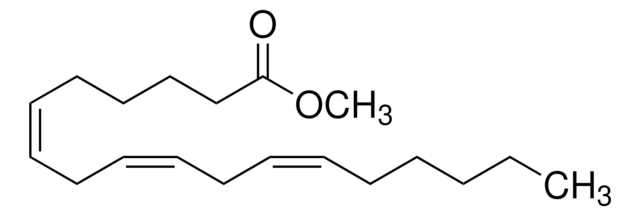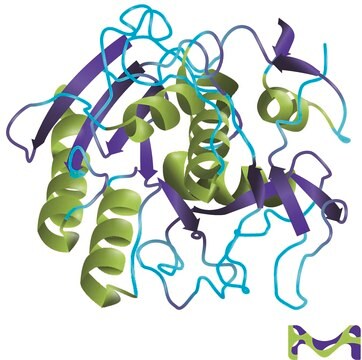L2626
Methyl linolenate
≥99% (GC)
Sinónimos:
Linolenic acid methyl ester, Methyl cis,cis,cis-9,12,15-octadecatrienoate
About This Item
Productos recomendados
biological source
plant
Quality Level
assay
≥99% (GC)
form
liquid
refractive index
n20/D 1.470 (lit.)
bp
182 °C/3 mmHg (lit.)
density
0.895 g/mL at 25 °C (lit.)
functional group
ester
lipid type
unsaturated FAs
shipped in
ambient
storage temp.
−20°C
SMILES string
CC\C=C/C\C=C/C\C=C/CCCCCCCC(=O)OC
InChI
1S/C19H32O2/c1-3-4-5-6-7-8-9-10-11-12-13-14-15-16-17-18-19(20)21-2/h4-5,7-8,10-11H,3,6,9,12-18H2,1-2H3/b5-4-,8-7-,11-10-
InChI key
DVWSXZIHSUZZKJ-YSTUJMKBSA-N
¿Está buscando productos similares? Visita Guía de comparación de productos
Application
- Exogenous Jasmonic Acid Alleviates Blast Resistance Reduction Caused by LOX3 Knockout in Rice.: The research explores the role of jasmonic acid, associated with methyl linolenate, in enhancing blast resistance in rice. The findings show that external application of jasmonic acid can compensate for the resistance loss due to LOX3 knockout, providing insights into plant disease management strategies (Su et al., 2023).
- Effects of (13)C isotope-labeled allelochemicals on the growth of the invasive plant Alternanthera philoxeroides.: This study uses (13)C-labeled methyl linolenate to trace allelochemical effects on invasive plant species. The results indicate a significant impact on plant growth, suggesting potential applications in controlling invasive species (Hua et al., 2023).
Biochem/physiol Actions
Storage Class
10 - Combustible liquids
wgk_germany
WGK 1
flash_point_f
235.4 °F - closed cup
flash_point_c
113.0 °C - closed cup
ppe
Eyeshields, Gloves, multi-purpose combination respirator cartridge (US)
Elija entre una de las versiones más recientes:
¿Ya tiene este producto?
Encuentre la documentación para los productos que ha comprado recientemente en la Biblioteca de documentos.
Los clientes también vieron
Nuestro equipo de científicos tiene experiencia en todas las áreas de investigación: Ciencias de la vida, Ciencia de los materiales, Síntesis química, Cromatografía, Analítica y muchas otras.
Póngase en contacto con el Servicio técnico











